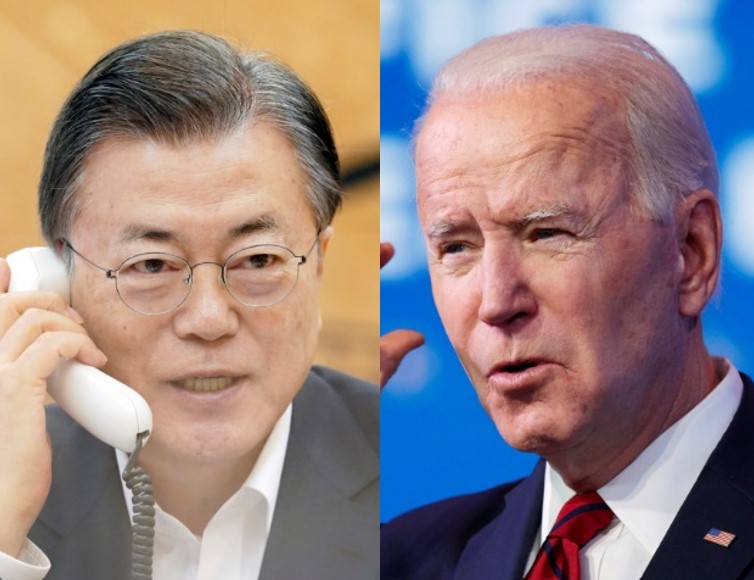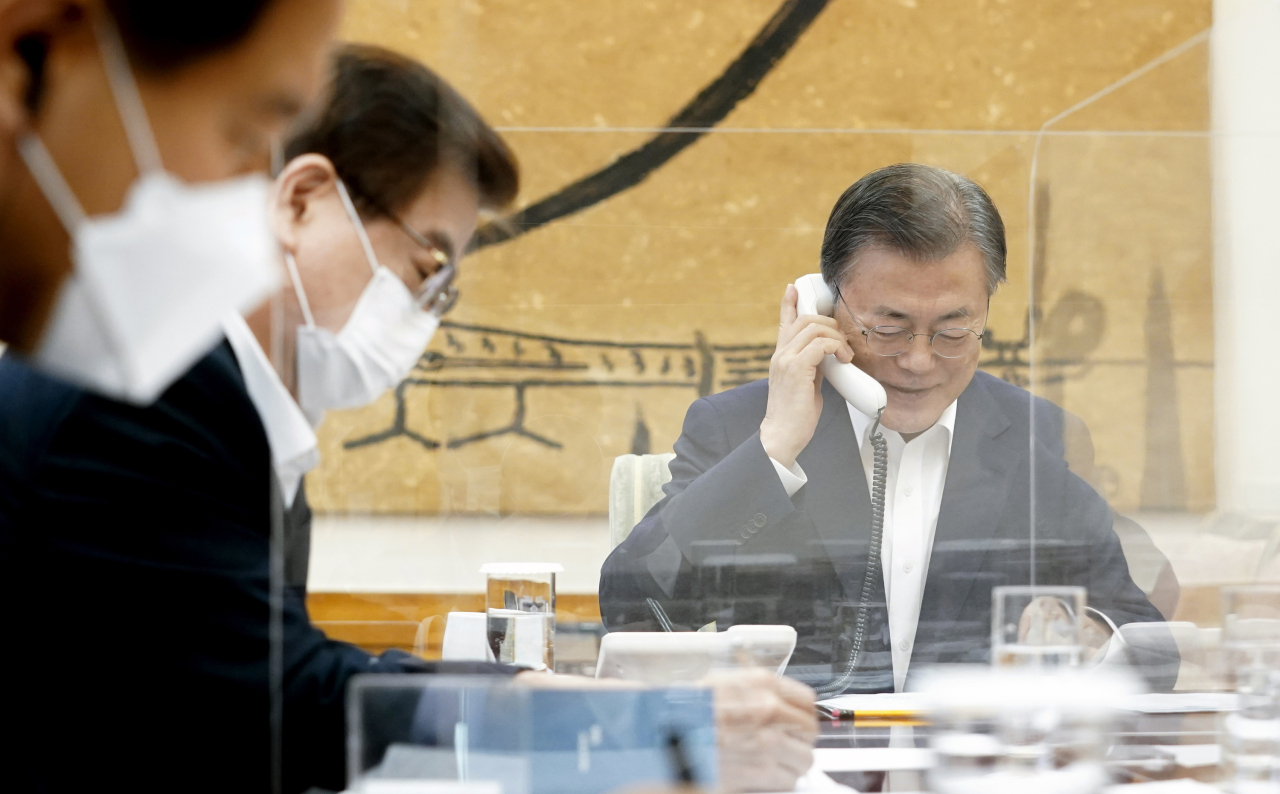Moon, Biden signal fresh restart of peace process on Korean Peninsula
Their first phone call, full of laughter, touched on a slew of topics from the pope to North Korea and Myanmar
By Lee Ji-yoonPublished : Feb. 4, 2021 - 15:02

President Moon Jae-in and his US counterpart, Joe Biden, held their first phone call Thursday, signaling a fresh restart of the South Korea-US alliance, the most critical strategic partnership in bringing peace to the Korean Peninsula.
The phone call, which started at 8:25 a.m. local time and lasted 32 minutes, came two weeks after Biden was sworn in as the 46th US president Jan. 20.
“The whole conversation was held in a friendly and professional mood, with the leaders sometimes sharing laughter,” a Cheong Wa Dae official said on condition of anonymity.
The official added that the leaders were off to a good start after remarking that they are the second Roman Catholic presidents of their respective countries. They allegedly discussed ways to seek cooperation from Pope Francis in tackling global challenges like climate change.
The first conversation between Moon and Biden drew keen attention here, given that the phone call between the two heads of state is widely seen as a stand-in for a summit in the middle of the COVID-19 pandemic.
Fueling the renewed interest was a surprise late-night call from Chinese President Xi Jinping last week. The two countries stressed that it was only a New Year’s greeting, but critics viewed it as an initial check-in from China before the Biden administration’s foreign policy for the Indo-Pacific region takes shape.
Addressing speculation about the “delayed” call from Biden, Seoul’s presidential office said, “What is important is not the timing or order of the call but the contents of the conversation.”
According to Cheong Wa Dae’s readout of the call, Moon and Biden pledged to “upgrade” the bilateral alliance, which has continued evolving over the past 70 years since the 1950-53 Korean War.
They agreed to further strengthen the alliance, which has focused on boosting peace and prosperity on the peninsula and in the Indo-Pacific region, into a more comprehensive partnership that can contribute to enhancing democracy, human rights and multilateralism beyond Asia.
Most notably, they reaffirmed their shared goal of denuclearizing the Korean Peninsula, pledging to promptly draw up a joint strategy on the North Korea issue.
Moon stressed joint efforts to advance the peace-building process, while Biden praised Seoul’s efforts so far, adding that it is important for the allies to maintain a shared stance on the matter.
They also agreed to ramp up efforts to improve Seoul-Tokyo relations as part of building stronger trilateral ties.
Other issues they discussed included China and Myanmar. They called for peaceful and democratic solutions to the Myanmar crisis, but no details were provided about their conversation on China.
Concluding their conversation, the leaders agreed to hold summit talks as soon as possible once the coronavirus situation is stabilized, citing the value of a face-to-face meeting.
Many expect positive synergy between the two liberal leaders, who have made issues like climate change and human rights central to their platforms. Since the administrations of former President Kim Dae-jung and President Bill Clinton in 1998-2001, it is the first time in two decades that the two nations have had liberal presidents at the same time.
Biden’s respect for Kim, who is known for his “Sunshine Policy” of engagement with the North, is also expected to extend to Moon, a former human rights lawyer whose life path and policy align closely with Kim’s.
Different timetables
But despite potential personal bonds, there are a pile of thorny issues waiting to be solved in a spillover from the Donald Trump administration.
Resuming the stalled denuclearization talks may be the top priority for Moon, but before that the two countries will have to rebuild trust on other issues, such as the stalemate in their defense-cost-sharing talks. They will also have to discuss the March joint military drills, which have been scaled down in recent years to appease Pyongyang.
As the US-China rivalry enters a new chapter under the Biden era, Seoul’s balancing diplomacy between its largest security ally and its biggest trading partner is also likely to be tested in the coming years.
It may take some time for the leaders to develop a deeper friendship in tackling the numerous challenges. And the clock is ticking for Moon, who is approaching his final year in office.

"The first six months seem crucial for Moon to obtain tangible results in inter-Korean relations, considering his legacy is largely occupied with the North Korea issue,” said Shin Beom-chul, director of the Center for Diplomacy and Security at the Korea Research Institute for National Strategy.
“But Biden is in no hurry and is likely to approach the issue step by step under a long-term plan for the next four years.”
From the very beginning of his presidency in 2017, Moon made a big effort to engage with the North. He had learned from the Roh Moo-hyun administration that such efforts were unlikely to gain momentum in a president’s final years in office.
After holding a successful summit with North Korean leader Kim Jong-un in 2018, Moon earned global praise for his mediating role later the same year, when he facilitated the historic first summit talks between Kim and Trump in Singapore. At that summit, Pyongyang agreed to denuclearization in exchange for security guarantees from Washington.
But the second North Korea-US summit in Hanoi in 2019 -- where the two sides were supposed to discuss concrete steps to achieve that goal -- collapsed without a deal, chilling inter-Korean relations as well.
Now that cross-border contacts have been halted for months, Seoul hopes that with the leadership transition in the US a breakthrough can be made in the deadlocked diplomacy -- possibly with the Singapore agreement as the starting point.
As part of those efforts, Moon has made several reconciliatory overtures to the North, saying he is open to dialogue “anytime, anywhere.” But the North has dismissed his suggestions for projects such as cooperation on COVID-19, calling the proposals “not essential.”
It also remains to be seen whether Biden, who has said he wants to reverse all the actions taken by Trump, will uphold commitments made during the Singapore summit.
“Unlike the Moon administration, both the US and the North have shown no particular urgency in ending the current stalemate. They seem to be gauging what would be the most favorable deal conditions,” Shin added.
By Lee Ji-yoon (jylee@heraldcorp.com)





![[Herald Interview] 'Amid aging population, Korea to invite more young professionals from overseas'](http://res.heraldm.com/phpwas/restmb_idxmake.php?idx=644&simg=/content/image/2024/04/24/20240424050844_0.jpg&u=20240424200058)












![[KH Explains] Korean shipbuilding stocks rally: Real growth or bubble?](http://res.heraldm.com/phpwas/restmb_idxmake.php?idx=652&simg=/content/image/2024/04/25/20240425050656_0.jpg&u=)

